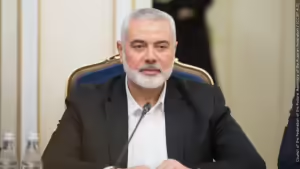31 July 2024 | 12:37 SAST
1-minute read

Ismail Haniyeh was born on January 29, 1963, in Gaza’s Shati refugee camp, after his family was displaced from their original village in the Negev desert during the 1948 Nakba (Arab-Israeli war).
He attended the Islamic University of Gaza, where he studied Arabic literature and joined the Islamic student movement, which had links to the Muslim Brotherhood.
Haniyeh played a role in founding Hamas during the late 1980s, which emerged as a significant force between 1987 and 1993 during the First Intifada, when Palestinian resistance advanced against Israeli occupation.
During his early political career, Israel detained Haniyeh multiple times for his involvement with Hamas.
Haniyeh became a close aide to Sheikh Ahmed Yassin and rose through the ranks of the movement, particularly after Israel assassinated Yassin in 2004.
In January 2006, Hamas won a majority in the Palestinian legislative elections. Haniyeh was nominated as Prime Minister of the Palestinian Authority (PA). On June 14, 2007, he was removed from this position by PA President Mahmoud Abbas in a co-ordinated plot by Israel, the USA and the PA to undermine Hamas rule and remove it from power.
After the clash in 2007, the Gaza Strip fell under the authority of Hamas, while the PA governed the West Bank.
Haniyeh was elected as the head of the political bureau of Hamas in 2017, after which he relocated to Qatar, and has been in exile ever since.
Haniyeh had lost numerous family members in Gaza because of Israeli strikes, including three of his sons, an elderly sister, and a number of his grandchildren. When he heard of their deaths, he remained calm and asked Allah to have mercy on them.
Haniyeh was known for his pragmatic approach and charismatic leadership within Hamas. He had a natural ability to inspire and mobilise people and was known for his tact and cautious approach. He favoured a calculated and measured technique over statements that could escalate tensions unnecessarily.
He had a strong connection with the people in Gaza and placed a significant emphasis on improving the situation of the Palestinian people by working to alleviate their hardships.
Haniyeh maintained a firm stance on resistance against Israeli occupation and continued to support armed resistance.
The information in this article was taken from various online sources.








0 Comments